

| Cry "Havoc" and let slip the crawley things! | |
| -- Frosty |
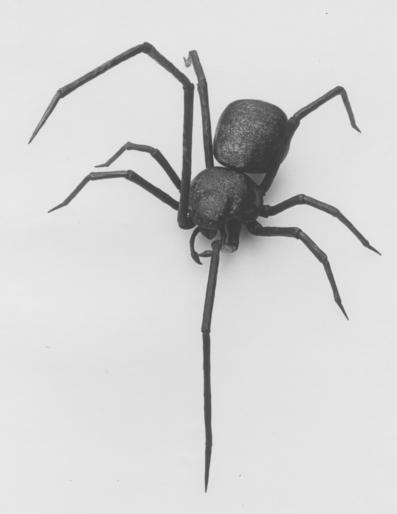 We have a wonderful bunch of spiders in my part of Nova Scotia. The
yellow & black argiopes are are my favorites -- yellow abdomen
with a sort of death mask in black on the back -- that weave
characteristic orb webs near the ground. On the other hand, there's
always one or two of the fat, squishy-looking orb weavers that create
webs spanning six or even 10 feet.
This steel spider is a composite. The abdomen and cephalothorax are
based on one sort with a fat abdomen and large fangs. The legs are
taken from another spider with a strikingly long front legs and a
characteristic gesture: she would reach one long leg tentatively
forward as if to detect suitable prey by light touch. Only after
several of these "braille" readings would she snatch the prey into her
jaws with those remarkably long front legs and devour it.
We have a wonderful bunch of spiders in my part of Nova Scotia. The
yellow & black argiopes are are my favorites -- yellow abdomen
with a sort of death mask in black on the back -- that weave
characteristic orb webs near the ground. On the other hand, there's
always one or two of the fat, squishy-looking orb weavers that create
webs spanning six or even 10 feet.
This steel spider is a composite. The abdomen and cephalothorax are
based on one sort with a fat abdomen and large fangs. The legs are
taken from another spider with a strikingly long front legs and a
characteristic gesture: she would reach one long leg tentatively
forward as if to detect suitable prey by light touch. Only after
several of these "braille" readings would she snatch the prey into her
jaws with those remarkably long front legs and devour it.
About three feet across the legs. Body is 16 ga. raised steel. The
legs and other extremities forged and chiseled steel. The legs are
welded to a bridge inside the cephalothorax. The welds are concealed
by repoussé plastron that is removable if repairs are needed.
Collection of Arthur Weyhe.
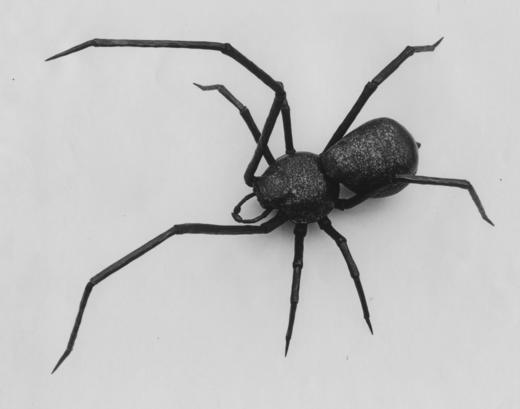
A friend hand-carried this critter to a show in Massachusetts but there was no easy way to ship it back. So a couple of years later I picked it up myself on a trip. You may easily believe that I drew some comments travelling by bus and ferry with this strapped to my back-pack.
Oh, yes: This is a male spider. You can tell by the mitten-like
pedipalps, those feeler-like things near ths jaws.
In the summer of 1963, back when it was meaningful to speak of
"the computer" at MIT, a friend had a summer job as a
programmer on the time share system there. She reported that someone
had created what today we would call a virus which, at random times,
connected to all the hard-copy terminals (the only kind there were
then), printed out "I am the unknown glitch. Catch me if you can" and
relocated itself in the system.
This piece is George's Unknown Glitch (which he's had for long enough
now that it should no longer be so very unknown.) Based loosely on a
family of wood-boring marine isopods known generally as gribbles which
are pursued by the owners of wooden boats and marine structures with
the same vengeance and hostility as computer glitches are pursued by
hackers.
Raised and planished 16 ga. steel, forged extremities. Numerous parts
assembled by welding, welds concealed by a planished plastron or
underbody piece. About 18" long.
This one was made from a piece of 16 ga. that had spent several years
as the fire-resistant surface on the floor of my first shop, so pitted
with rust that it was hard to sink the shape without perforating the
metal -- but what a nice surface texture that gives the little
critter. Done before I took Chris Ray's workshop, I didn't know about
raising on stakes so this was done with a couple of ballpiens and
cavities burned into the end grain a wood block.
This was supposed to be a one-off but after it sold, two people who
had seen it came to me and commissioned similar ones.
Steel sheet, forged steel, welding, about 16" long.
Alas, the silversmith pooped out on us and didn't make a bug. But we
all had a good time over coffee in the evening yakking about metal and
stuff.
Glitch
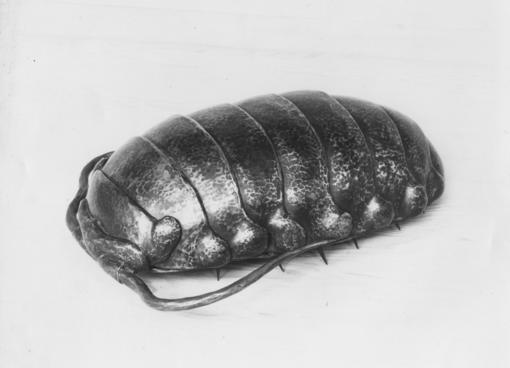 This was one of those wonderful commissions where the client says,
more or less, "I have this much money to spend. Make me something
neat." Commissioned by fellow artist George Allanson who is also a
computer enthusiast and technology manager.
This was one of those wonderful commissions where the client says,
more or less, "I have this much money to spend. Make me something
neat." Commissioned by fellow artist George Allanson who is also a
computer enthusiast and technology manager.
Mite
You didn't want to know about these guys. Because there really are
things like this. They live in the cracks in floor boards, in the
detritus under seat cushions and are sometimes lines up in row like
cars in a parking lot on the undersides of the wing covers of beetles.
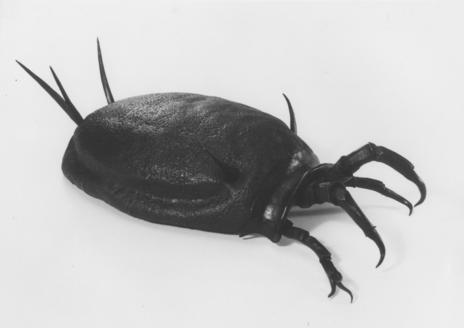 Some of them look pretty much like this one. Some have more spines or
hairs. Others look like little science fiction battle tanks so that
those legs in the front emerge from what appear to be armored doors.
All are rather smallish but you can see them with a good magnifying
glass. A 10x or slightly stronger field microscope is better.
Some of them look pretty much like this one. Some have more spines or
hairs. Others look like little science fiction battle tanks so that
those legs in the front emerge from what appear to be armored doors.
All are rather smallish but you can see them with a good magnifying
glass. A 10x or slightly stronger field microscope is better.
The Great Bug Contest
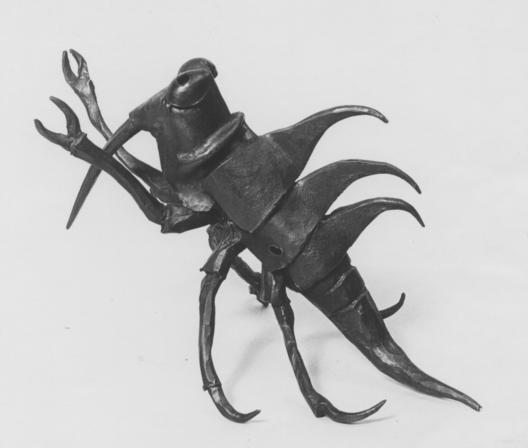 Well, it wasn't all that great a contest but it was fun. Once upon a
time, Pancho Peterson dropped by on his travels from Arizona to points
unspecified (does anybody know what happend to Pancho?) and spent a
few weeks here. One day, I took him to visit another metalworker, a
silversmith and jeweler, and over coffee we agreed to have a Bug
Contest . We'd each make a bug that day and compare results in
the evening. Pancho and I went off to my shop where I had two forges.
Pancho made a very creditable dragon fly. And I made this.
Well, it wasn't all that great a contest but it was fun. Once upon a
time, Pancho Peterson dropped by on his travels from Arizona to points
unspecified (does anybody know what happend to Pancho?) and spent a
few weeks here. One day, I took him to visit another metalworker, a
silversmith and jeweler, and over coffee we agreed to have a Bug
Contest . We'd each make a bug that day and compare results in
the evening. Pancho and I went off to my shop where I had two forges.
Pancho made a very creditable dragon fly. And I made this.
War Bug
And then there's Robert Asprin's
War Bug .